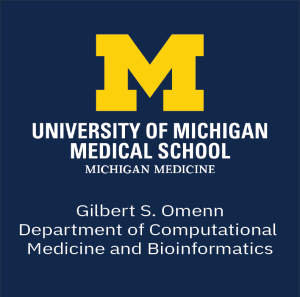Presented By: Department of Computational Medicine and Bioinformatics DCMB
Tools and Technology Seminar by Michele Peruzzi
"Joint Cancer Ecology Models: probabilistic methods for population-level tumor microenvironment analysis"

Abstract
The tumor microenvironment (TME) is a densely populated ecosystem where cells live side by side, shaping each other’s behavior much like species in habitats. Modern imaging technologies now allow us to map the exact location and type of cells across heterogeneous populations of patients, providing unprecedented resolution into this hidden ecology. Yet many analytic pipelines reduce this complexity to simple counts of each cell type, analyze one marker or cell at a time, or incorporate spatial information via ad-hoc or simplistic rules, failing to fully capture the overall spatial organization of the TME.
Statistical ecology offers a principled alternative. Rather than treating each component (cell type, interaction, or patient image) in isolation, population-level statistical ecology models study the joint spatial arrangement of all cells at once for the entire patient cohort. These models capture statistically significant patterns of co-location, avoidance, interaction, or spatial clustering that arise from complex intercellular dynamics and differentiate across patients based on covariates. These transparent, probabilistic models interpretably summarize how spatial structure changes across patients, quantify uncertainty, and enable rigorous comparisons across different tumor subtypes or treatment groups. In this way, they move beyond black-box pattern detection to uncover generalizable biological signals, distinguishing disease-driven remodeling of tissue architecture from random individual variability.
We introduce bipps (Bayesian Inference of Point Patterns in Space), our first step toward a comprehensive statistical ecology pipeline for TME analysis. bipps is an open source R package that implements and generalizes advanced statistical ecology models for multivariate spatial data.
About the DCMB Tools & Technology Seminar Series
The DCMB Tools and Technology Seminar Series is held in Palmer Commons, Room 2036, each Thursday at 12pm EST. Each seminar highlights a computational tool, technology, or methodology that is under development or in current use and is of special interest to DCMB and University researchers. Presenters are U-M researchers and students.
These seminars are live-streamed and recorded and made available for future viewing via the DCMB YouTube Channel
The tumor microenvironment (TME) is a densely populated ecosystem where cells live side by side, shaping each other’s behavior much like species in habitats. Modern imaging technologies now allow us to map the exact location and type of cells across heterogeneous populations of patients, providing unprecedented resolution into this hidden ecology. Yet many analytic pipelines reduce this complexity to simple counts of each cell type, analyze one marker or cell at a time, or incorporate spatial information via ad-hoc or simplistic rules, failing to fully capture the overall spatial organization of the TME.
Statistical ecology offers a principled alternative. Rather than treating each component (cell type, interaction, or patient image) in isolation, population-level statistical ecology models study the joint spatial arrangement of all cells at once for the entire patient cohort. These models capture statistically significant patterns of co-location, avoidance, interaction, or spatial clustering that arise from complex intercellular dynamics and differentiate across patients based on covariates. These transparent, probabilistic models interpretably summarize how spatial structure changes across patients, quantify uncertainty, and enable rigorous comparisons across different tumor subtypes or treatment groups. In this way, they move beyond black-box pattern detection to uncover generalizable biological signals, distinguishing disease-driven remodeling of tissue architecture from random individual variability.
We introduce bipps (Bayesian Inference of Point Patterns in Space), our first step toward a comprehensive statistical ecology pipeline for TME analysis. bipps is an open source R package that implements and generalizes advanced statistical ecology models for multivariate spatial data.
About the DCMB Tools & Technology Seminar Series
The DCMB Tools and Technology Seminar Series is held in Palmer Commons, Room 2036, each Thursday at 12pm EST. Each seminar highlights a computational tool, technology, or methodology that is under development or in current use and is of special interest to DCMB and University researchers. Presenters are U-M researchers and students.
These seminars are live-streamed and recorded and made available for future viewing via the DCMB YouTube Channel